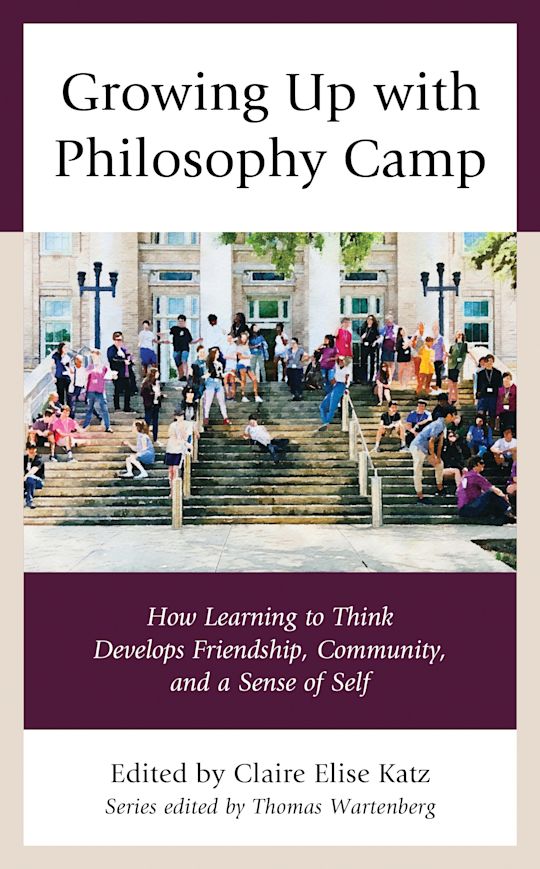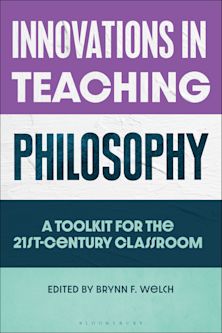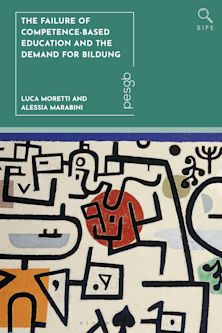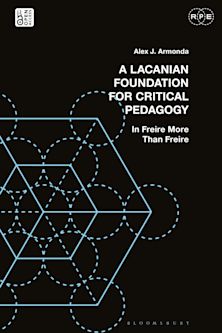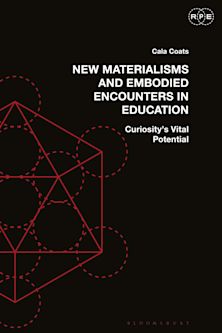- Home
- ACADEMIC
- Education
- Philosophy of Education
- Growing Up with Philosophy Camp
Growing Up with Philosophy Camp
How Learning to Think Develops Friendship, Community, and a Sense of Self
Growing Up with Philosophy Camp
How Learning to Think Develops Friendship, Community, and a Sense of Self
This product is usually dispatched within 3 days
- Delivery and returns info
-
Free CA delivery on orders $40 or over
You must sign in to add this item to your wishlist. Please sign in or create an account
Description
Growing up with Philosophy Camp joins the substantial body of literature that contravenes centuries of thinkers in the history of philosophy who stated emphatically that children either could not or should not engage in philosophical discourse. This book differs from the rest of the literature in that it reveals the extraordinary impact of philosophy camps for pre-college age students (as young as 6 years old through high school). Often only a week in duration, philosophy camp combines the intensity of both summer camp and philosophical dialogue, creating a powerful experience for young people who, contrary to cynical views of “youth today,” desire intellectual engagement. Through the chapters by the staff who facilitate discussions, a university dean who supported the program, and reflections from campers and parents, a recurring theme emerges: philosophy camps build authentic friendship, intellectual community, and an increased awareness of self-identity. Yet the chapters display remarkable diversity by connecting the experience of philosophy camp to questions in the history of philosophy, philosophy’s relationship to artistic creation, and the therapeutic value of philosophical discourse.
Table of Contents
Preface: Claire Katz
Acknowledgements
Introduction : Claire Katz
I: Dispatches from Philosophy Summer Camps
Chapter 1: Philosophy for the Young, Curious, and Hungry
Pamela R. Matthews
“Chapter 2: “Without friends no one would choose to live”: Friendship, Phronesis, and Philosophy Summer Camp
Desirae Embree and Claire Katz
Chapter 3: Between and Among Friends
Daniel Conway
Chapter 4: Waking to Wonder: The Wittgensteinian Ethos of Philosophizing with Children
David Anderson
Chapter 5: Underestimated No More
Natalie Fletcher
Chapter 6: Make Your Life a Work of Art: Growing-up with MOSHI philo-artistic camp in Paris and New-York City
Caroline Murgue
Chapter 7: Philosophy Meets Place: Creating and Environmental Philosophy Summer Camp
Rika Tsuji and Benn Johnson
Chapter 8: The Utah Lyceum: Cultivating “Reasonableness” in Southwest Utah
Kristopher G. Phillips and Gracia Allen
Chapter 9: Philosophy Camp and Self-Confidence
Amelia Kahn
Part II: Campfire Tales
Chapter 10: Aggie School of Athens
Kenji Blum
Olivia Conway
Evie Conway
Jadyn Driver
Tonya Driver
Amy Ellison
Angus Heartsill
Laura Hoeting and Griffin Ford
Chapter 11: Utah Lyceum
Addi Achord
Sam Cook
Erin Waldman
Author Bios
Product details
| Published | Aug 15 2020 |
|---|---|
| Format | Paperback |
| Edition | 1st |
| Extent | 174 |
| ISBN | 9781475847222 |
| Imprint | Rowman & Littlefield Publishers |
| Illustrations | 24 b/w photos; 2 textboxes |
| Dimensions | 215 x 152 mm |
| Series | Big Ideas for Young Thinkers |
| Publisher | Bloomsbury Publishing |
About the contributors
Reviews
-
In this splendid collection of essays written by philosophy camps facilitators and campers – professors and high school students together- Claire Katz shows the tremendously positive impact that philosophy can have on youth. Engaging with philosophy enhances self-confidence and critical thinking, as well as responsibility, respect and solidarity. This book is compelling evidence that philosophy is relevant to everyday life and helps people young and old think, feel and connect.
Annabel Herzog, Professor of Political Theory, University of Haifa
-
Summer camp is, as a concept, under-theorized and under-appreciated. For many coming-of-age minors, summer camp serves as one of their first civic-associational experiences, a formative exercise in learning how to get along with strangers, away from local friends and family. But why should that experience be limited to hiking, tennis, or Python boot camp? Why not introduce tweens and teens to the pleasures of thinking, and awakening them to the joys of thoughtful discussion with each other? Claire Katz and the contributors to Growing Up With Philosophy Camp: How Thinking Develops Friendship, Community, and a Sense of Self explain the rationale and the on-the-ground success of the innovative philosophy summer camps they have organized. If only my own children would have had such an opportunity!
John Seery, George Irving Thompson Memorial Professor of Government and Professor of Politics
-
If you have ever wondered about a philosophy camp, questioned its value, or considered hosting one at your institution, then these books are for you. With a robust introductory essay, and nine carefully focused chapters written by experienced practitioners from across the world and scintillating selections from campers and parents, Growing Up with Philosophy Camp offers a wealth of insights about why philosophy camps are a singularly transformative experience. In short, philosophy camps provide occasion pre-college students to engage in serious, open-ended discussions with their peers, exercise and improve their thinking, and participate in communal and creative problem-solving—as well as lots of good old-fashioned fun. Together, these readable essays provide a compelling argument for why pre-college students should have the opportunity to do philosophy. Moreover, they demonstrate the value of reawakening wonder in our young people and nourishing their natural inclination to make sense of the world. Philosophy Camps for Youth provides practical guidance on every aspect of hosting a philosophy camp, from management, training and marketing to curriculum and pedagogical practice. Just as philosophy camps inspire the allegiance of returning campers, these expertly edited books will inspire the loyalty of returning readers.
Megan Jane Laverty, Associate Professor of Philosophy and Education, Teachers College, Columbia University
-
This important book of essays demonstrates beyond any doubt that philosophy camps offer every bit as much as sports and art camps as the go-to place to send our children for enrichment. Indeed, the opportunities these camps provide to develop young hearts and minds through confronting life’s big questions and some of philosophy’s most well-known thinkers are unique. In this rich collection, facilitators, parents, and students testify to transformative experiences that enhance cognitive, emotional, and social capacities to live a better life.
Cynthia Willett, Samuel Candler Dobbs professor of philosophy, Emory University; coauthor, "Uproarious: How Feminists and Other Comic Subversives Speak Truth"
-
Democracy is currently at risk - do we have the skills to make it work? What are those skills? It is not unusual to find authors suggesting that humanities education is important for a successful democracy. But the model of humanities education that would accomplish this is, at best, obscure, and at worst, elitist. Growing Up with Philosophy Camp offers a model of doing philosophy in community and establishing friendships in a process of collective open-ended inquiry. This is a model that can form a basis for democratic citizenship where our different backgrounds and values do not stand between us, but enrich us.
Sally Haslanger, Ford Professor of Philosophy and Women's and Gender Studies, Massachusetts Institute of Technology
-
Aristotle once suggested that there was a paradox at the core of learning philosophy: old folks could learn philosophy but didn't have enough of their lives left to practice it; kids had lots of time but little interest in learning. Katz has compiled significant evidence to the contrary. Not only can young adults learn philosophical lessons that transform and enrich their lives, but they will spend their precious summers doing it. Get the kids ready, give them the chance, and they will become philosophy campers.
John Kaag, author, “Hiking with Nietzsche: On Becoming Who You Are”








